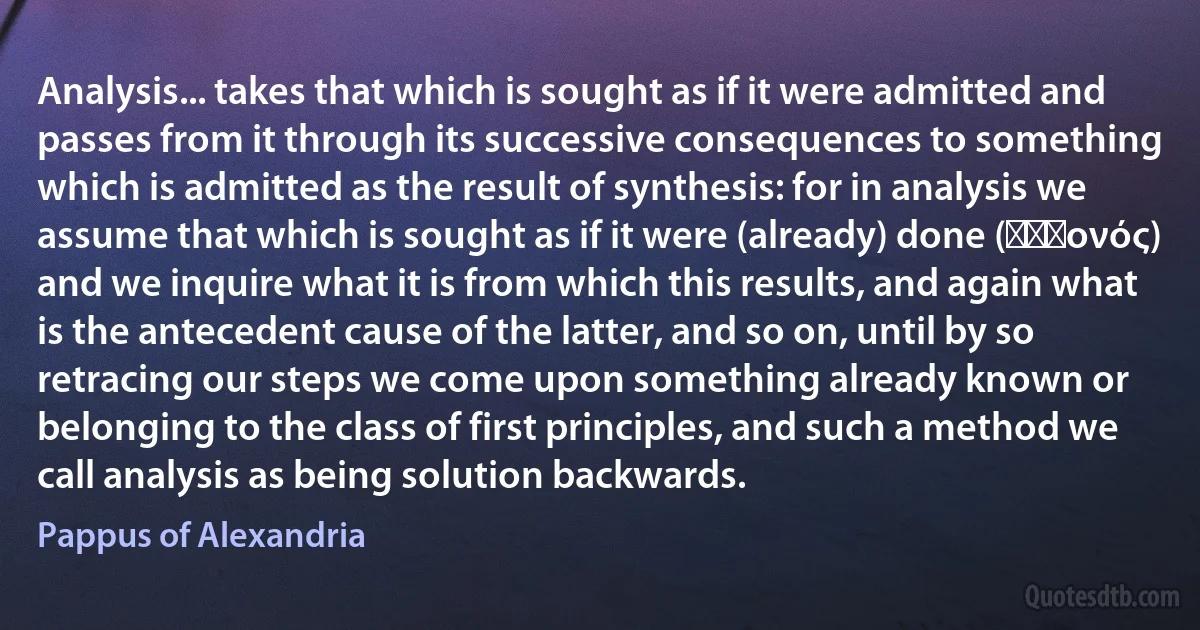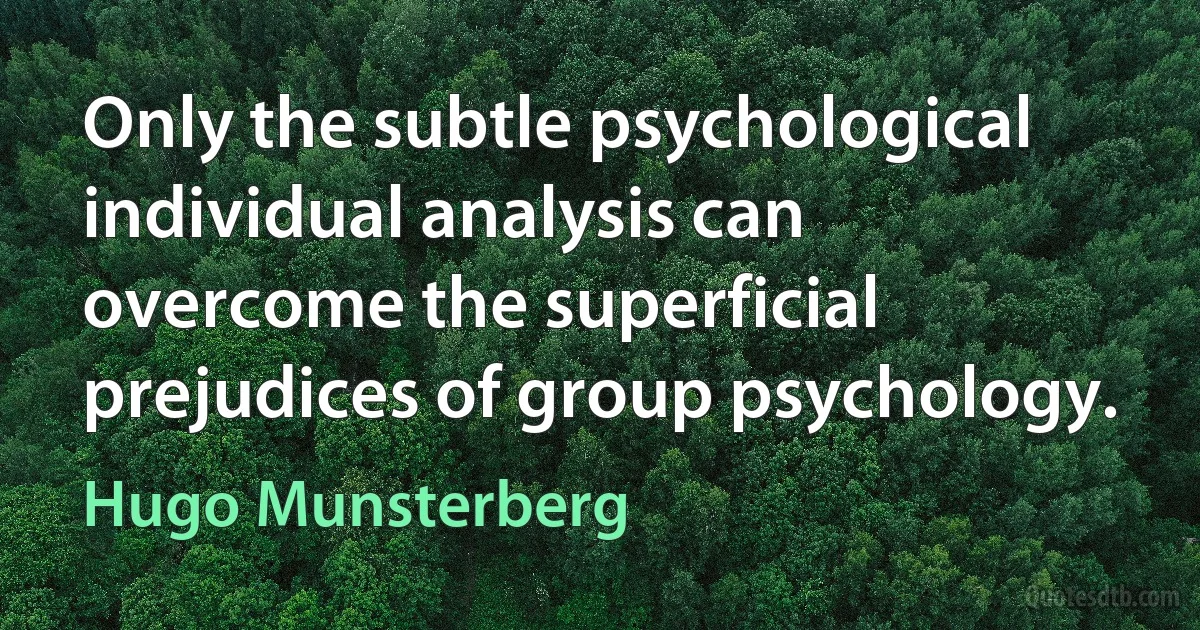Analysis Quotes - page 22
The idea of an art world forms the backbone of my analysis. "Art world" is commonly used by writers on the arts in a loose and metaphoric way, mostly to refer to the most fashionable people associated with those newsworthy objects and events that command astronomical prices. I have used the term in a more technical way, to denote the the network of people whose cooperative activity, organized via their joint knowledge of conventional means of doing things, produce(s) the kind of art works that art world is noted for.

Howard S. Becker
General systems theory (in the narrow sense of the term) is a discipline concerned with the general properties and laws of "systems”. A system is defined as a complex of components in interaction, or by some similar proposition. Systems theory tries to develop those principles that apply to systems in general, irrespective of the nature of the system, of their components, and of the relations or "forces” between them. The system components need not even be material, as, for example, in the system analysis of a commercial enterprise where components such as buildings, machines, personnel, money and "good will” of customers enter.

Ludwig von Bertalanffy
Systems thinking plays a dominant role in a wide range of fields from industrial enterprise and armaments to esoteric topics of pure science. Innumerable publications, conferences, symposia and courses are devoted to it. Professions and jobs have appeared in recent years which, unknown a short while ago, go under names such as systems design, systems analysis, systems engineering and others.

Ludwig von Bertalanffy
Our reasons for critiquing the [child protection] system [are] pointless. To analyze the system and point out what's wrong with it, without the power to alter it, is masturbatory. The whole concept behind analysis is the concept behind consciousness–raising. Which is, if I show you that something is terrible, you will do something about it. That's not reality. Reality is, it's about power. It's not about education, and knowledge is not power.

Andrew Vachss
There is a certain way of searching for the truth in mathematics that Plato is said first to have discovered; Theon named it analysis, and defined it as the assumption of that which is sought as if it were admitted and working through its consequences to what is admitted to be true. This is opposed to synthesis, which is the assuming what is admitted and working through its consequences to arrive at and to understand that which is sought.

Francois Viete
Accounting for the artificial boom and the consequent bust is not part of Keynesian income-expenditure analysis, nor is it an integral part of monetarist analysis. The absence of any significant relationship between boom and bust is an inevitable result of dealing with the investment sector in aggregate terms. The analytical oversight derives from theoretical formulation in Keynesian analysis and from empirical observation in monetarist analysis. But from an Austrian perspective, the differences in method and substance are outweighed by the common implication of Keynesianism and monetarism, namely, that there is no boom-bust cycle of any macroeconomic significance.

Roger Garrison
As I was reading the extract from your paper in the geometric sum and difference... I was struck by the marvelous similarity between your results and those discoveries which I made even as early as 1832...
I conceived the first idea of the geometric sum and difference of two or more lines and also of the geometric product of two or three lines in that year (1832). This idea is in all ways identical to that presented in your paper. But since I was for a long time occupied with entirely different pursuits, I could not develop this idea. It was only in 1839 that I was led back to that idea and pursued this geometrical analysis up to the point where it ought to be applicable to all mechanics. It was possible for me to apply this method of analysis to the theory of tides, and in this I was astounded by the simplicity of the calculations resulting from this method.

Hermann Grassmann
A work on tidal theory... led me to Lagrange's Mécanique analytique and thereby I returned to those ideas of analysis. All the developments in that work were transformed through the principles of the new analysis in such a simple way that the calculations often came out more than ten times shorter than in Lagrange's work.

Hermann Grassmann
The concept of rotation led to geometrical exponential magnitudes, to the analysis of angles and of trigonometric functions, etc. I was delighted how thorough the analysis thus formed and extended, not only the often very complex and unsymmetric formulae which are fundamental in tidal theory, but also the technique of development parallels the concept.

Hermann Grassmann
The concept of centroid as sum led me to examine Möbius' Barycentrische Calcul, a work of which until then I knew only the title; and I was not little pleased to find here the same concept of the summation of points to which I had been led in the course of the development. This was the first, and... the only point of contact which my new system of analysis had with the one that was already known.

Hermann Grassmann
While I was pursuing the concept of geometrical product, as this idea was established by my father... I concluded that not only rectangles, but also parallelograms, may be viewed as products of two adjacent sides, provided that the sides are viewed not merely as lengths, but rather as directed magnitudes. When I joined this concept of geometrical product with the previously established idea of geometrical sum the most striking harmony resulted. Thus when I multiplied the sum of two vectors by a third coplaner vector, the result coincided (and must always coincide) with the result obtained by multiplying separately each of the two original vectors by the third... and adding together (with due attention to positive and negative values) the two products. [Thus A(B + C) = AB + AC. ]
From this harmony I came to see a whole new area of analysis was opening up which could lead to important results.

Hermann Grassmann
The approach that dominates organizational theory, teaching, and practice for most of the twentieth century looked at organizations from the top-down, starting with a view of the CEO as the "leader" who shapes the organization's strategy, structure, culture, and performance potential. The nature of work and the role of the workforce enter the analysis much later, after considerations of technology and organization design have been considered. However, if the key source of value in the twenty-first-century organization is to be derived from the workforce itself, an inversion of the dominant approach will be needed. The new perspective will start not at the top of the organization, but at but at the front lines, with people and the work itself - which is where value is created. Such an inversion will lead to a transformation in the management and organization of work workers, and knowledge. This transformation was signalled by McGregor, but we must go further.

Douglas McGregor
The theories in this chapter, focusing on the individual level of analysis, differ somewhat from those in the next chapter, in which a more organizational level of analysis is employed. Although all of the theories are essentially cognitive and social definitionist in nature, particularly as developed in the general sociological literature, there are at least two important subgroups within the social constructionist perspective.

Jeffrey Pfeffer
There is so much to be learned by studying how Dr. Ishikawa managed to accomplish so much during a single lifetime. In my observation, he did so by applying his natural gifts in an exemplary way. He was dedicated to serving society rather than serving himself. His manner was modest, and this elicited the cooperation of others. He followed his own teachings by securing facts and subjecting them to rigorous analysis. He was completely sincere, and as a result was trusted completely.

Joseph M. Juran
Calculating risks does not mean taking a gamble. It is more than figuring the odds. It is not reducible to a formula. It is the analysis of all factors which collectively indicate whether or not the consequences to ourselves will be more than compensated for by the damage to the enemy or interference with his plans. Correct calculation of risks, by orderly reasoning, is the responsibility of every naval officer who participates in combat, and many who do not.

Ernest King



